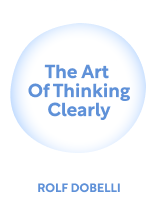

This article is an excerpt from the Shortform book guide to "The Art of Thinking Clearly" by Rolf Dobelli. Shortform has the world's best summaries and analyses of books you should be reading.
Like this article? Sign up for a free trial here .
What is inattentional blindness? Why does this effect occur?
Inattentional blindness is a tendency to zone in on certain aspects of a situation and disregard the rest. Inattentional blindness is the result of the brain’s limited cognitive capacity: it simply doesn’t have the resources to process everything.
Keep reading to learn about the phenomenon of intentional blindness, why it occurs, and how to combat it.
Inattentional Blindness
What is inattentional blindness? Inattentional blindness means humans tend to zone into specific elements of a situation, focusing only on the details they deem important. Once in this focused state, you might not notice even obvious distractions: Your brain filters them out, deeming them less important.
However, the biggest problem with the illusion of attention is that you believe your observation skills are great, Dobelli argues. Because your brain doesn’t retain any information about “unimportant” observations, you think you’re noticing everything in your area and overestimate your abilities. This overconfidence means you don’t question your true abilities or challenge yourself to notice more.
The illusion of attention isn’t a problem when you’re focusing on one activity and the rest of your surroundings continue as usual, such as reading a book while walking in a familiar area. In this case, your attention can split to handle the tasks of reading and walking, Dobelli explains.
However, once an unusual event is introduced, your brain can’t handle all its tasks at once and starts to make mistakes due to your overconfidence, Dobelli says. For example, if your dog walked in front of you as you’re reading, you might step on its tail. Because you believe your observation skills are stronger than they are, you aren’t careful enough to avoid stepping on it.

———End of Preview———
Like what you just read? Read the rest of the world's best book summary and analysis of Rolf Dobelli's "The Art of Thinking Clearly" at Shortform .
Here's what you'll find in our full The Art of Thinking Clearly summary :
- A detailed look at the most common logical fallacies that inhibit decision-making
- How to recognize and overcome these fallacies to make better decisions
- Why you value things for arbitrary reasons






